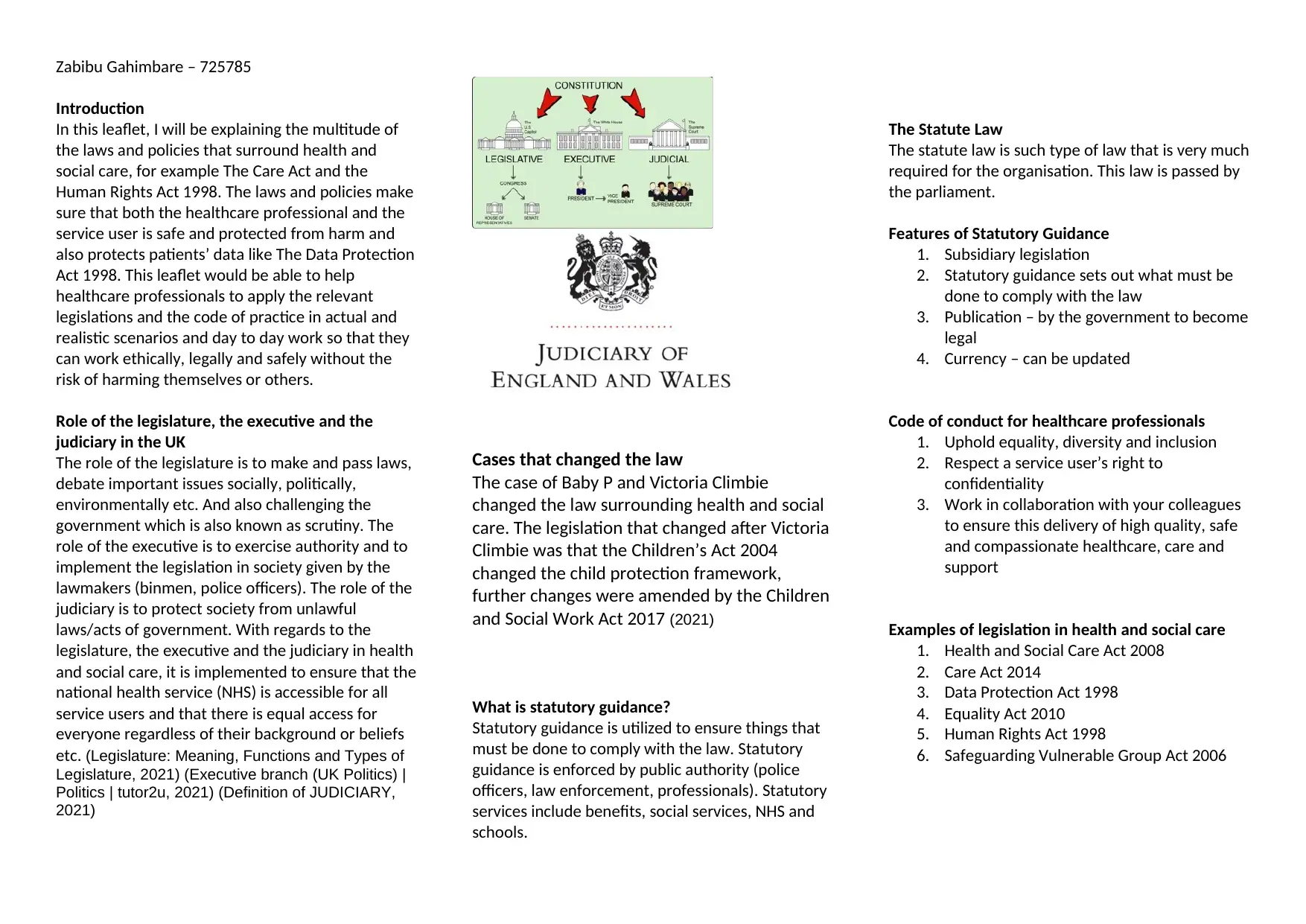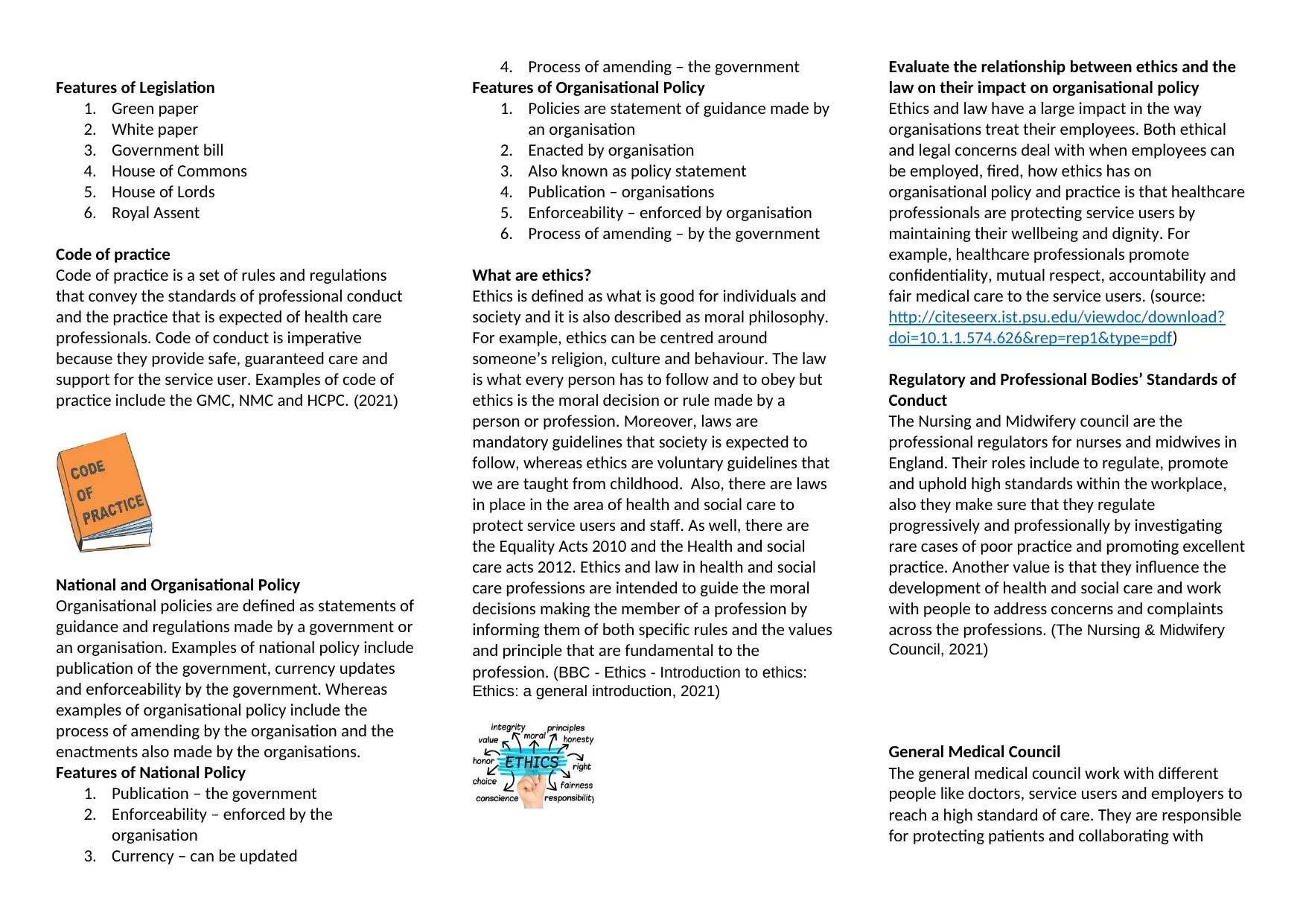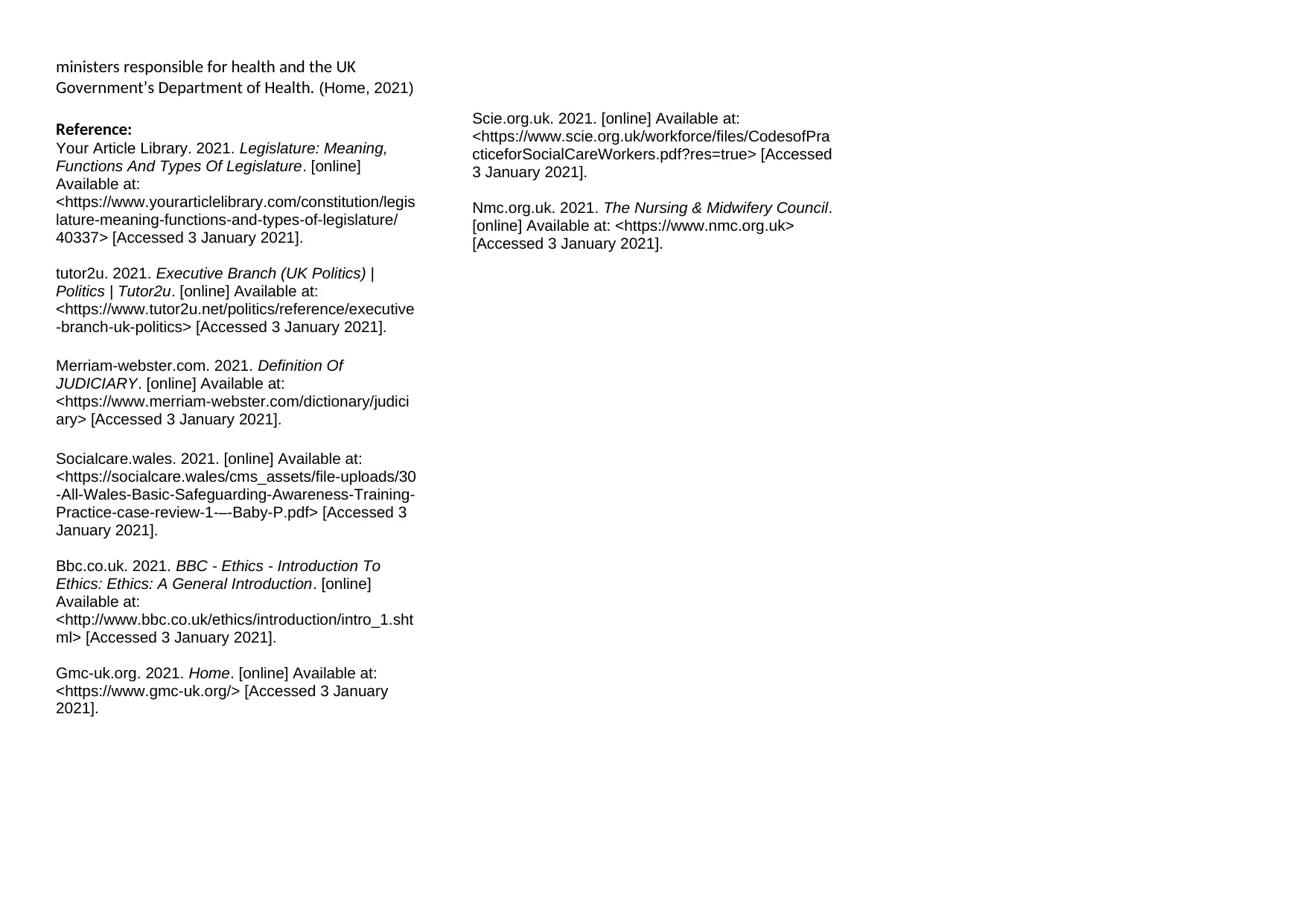Analysis of Laws, Policies, and Ethics in Health and Social Care
VerifiedAdded on 2021/06/05
|3
|1418
|70
Report
AI Summary
This report provides an overview of the laws and policies that govern health and social care, emphasizing the importance of legislation like the Care Act and the Human Rights Act 1998, as well as data protection. It details the roles of the legislature, executive, and judiciary in the UK and highlights landmark cases that have changed the law. The report also explains statutory guidance, code of conduct, and the features of national and organizational policies. Furthermore, it explores the relationship between ethics and law, and their impact on organizational policy. Finally, it examines the standards of conduct set by regulatory and professional bodies like the Nursing and Midwifery Council (NMC) and the General Medical Council (GMC), providing a comprehensive understanding of the legal, ethical, and professional frameworks in healthcare. This report aims to assist healthcare professionals in applying relevant legislation and codes of practice to ensure ethical, legal, and safe practice.

Zabibu Gahimbare – 725785
Introduction
In this leaflet, I will be explaining the multitude of
the laws and policies that surround health and
social care, for example The Care Act and the
Human Rights Act 1998. The laws and policies make
sure that both the healthcare professional and the
service user is safe and protected from harm and
also protects patients’ data like The Data Protection
Act 1998. This leaflet would be able to help
healthcare professionals to apply the relevant
legislations and the code of practice in actual and
realistic scenarios and day to day work so that they
can work ethically, legally and safely without the
risk of harming themselves or others.
Role of the legislature, the executive and the
judiciary in the UK
The role of the legislature is to make and pass laws,
debate important issues socially, politically,
environmentally etc. And also challenging the
government which is also known as scrutiny. The
role of the executive is to exercise authority and to
implement the legislation in society given by the
lawmakers (binmen, police officers). The role of the
judiciary is to protect society from unlawful
laws/acts of government. With regards to the
legislature, the executive and the judiciary in health
and social care, it is implemented to ensure that the
national health service (NHS) is accessible for all
service users and that there is equal access for
everyone regardless of their background or beliefs
etc. (Legislature: Meaning, Functions and Types of
Legislature, 2021) (Executive branch (UK Politics) |
Politics | tutor2u, 2021) (Definition of JUDICIARY,
2021)
Cases that changed the law
The case of Baby P and Victoria Climbie
changed the law surrounding health and social
care. The legislation that changed after Victoria
Climbie was that the Children’s Act 2004
changed the child protection framework,
further changes were amended by the Children
and Social Work Act 2017 (2021)
What is statutory guidance?
Statutory guidance is utilized to ensure things that
must be done to comply with the law. Statutory
guidance is enforced by public authority (police
officers, law enforcement, professionals). Statutory
services include benefits, social services, NHS and
schools.
The Statute Law
The statute law is such type of law that is very much
required for the organisation. This law is passed by
the parliament.
Features of Statutory Guidance
1. Subsidiary legislation
2. Statutory guidance sets out what must be
done to comply with the law
3. Publication – by the government to become
legal
4. Currency – can be updated
Code of conduct for healthcare professionals
1. Uphold equality, diversity and inclusion
2. Respect a service user’s right to
confidentiality
3. Work in collaboration with your colleagues
to ensure this delivery of high quality, safe
and compassionate healthcare, care and
support
Examples of legislation in health and social care
1. Health and Social Care Act 2008
2. Care Act 2014
3. Data Protection Act 1998
4. Equality Act 2010
5. Human Rights Act 1998
6. Safeguarding Vulnerable Group Act 2006
Introduction
In this leaflet, I will be explaining the multitude of
the laws and policies that surround health and
social care, for example The Care Act and the
Human Rights Act 1998. The laws and policies make
sure that both the healthcare professional and the
service user is safe and protected from harm and
also protects patients’ data like The Data Protection
Act 1998. This leaflet would be able to help
healthcare professionals to apply the relevant
legislations and the code of practice in actual and
realistic scenarios and day to day work so that they
can work ethically, legally and safely without the
risk of harming themselves or others.
Role of the legislature, the executive and the
judiciary in the UK
The role of the legislature is to make and pass laws,
debate important issues socially, politically,
environmentally etc. And also challenging the
government which is also known as scrutiny. The
role of the executive is to exercise authority and to
implement the legislation in society given by the
lawmakers (binmen, police officers). The role of the
judiciary is to protect society from unlawful
laws/acts of government. With regards to the
legislature, the executive and the judiciary in health
and social care, it is implemented to ensure that the
national health service (NHS) is accessible for all
service users and that there is equal access for
everyone regardless of their background or beliefs
etc. (Legislature: Meaning, Functions and Types of
Legislature, 2021) (Executive branch (UK Politics) |
Politics | tutor2u, 2021) (Definition of JUDICIARY,
2021)
Cases that changed the law
The case of Baby P and Victoria Climbie
changed the law surrounding health and social
care. The legislation that changed after Victoria
Climbie was that the Children’s Act 2004
changed the child protection framework,
further changes were amended by the Children
and Social Work Act 2017 (2021)
What is statutory guidance?
Statutory guidance is utilized to ensure things that
must be done to comply with the law. Statutory
guidance is enforced by public authority (police
officers, law enforcement, professionals). Statutory
services include benefits, social services, NHS and
schools.
The Statute Law
The statute law is such type of law that is very much
required for the organisation. This law is passed by
the parliament.
Features of Statutory Guidance
1. Subsidiary legislation
2. Statutory guidance sets out what must be
done to comply with the law
3. Publication – by the government to become
legal
4. Currency – can be updated
Code of conduct for healthcare professionals
1. Uphold equality, diversity and inclusion
2. Respect a service user’s right to
confidentiality
3. Work in collaboration with your colleagues
to ensure this delivery of high quality, safe
and compassionate healthcare, care and
support
Examples of legislation in health and social care
1. Health and Social Care Act 2008
2. Care Act 2014
3. Data Protection Act 1998
4. Equality Act 2010
5. Human Rights Act 1998
6. Safeguarding Vulnerable Group Act 2006
Paraphrase This Document
Need a fresh take? Get an instant paraphrase of this document with our AI Paraphraser

Features of Legislation
1. Green paper
2. White paper
3. Government bill
4. House of Commons
5. House of Lords
6. Royal Assent
Code of practice
Code of practice is a set of rules and regulations
that convey the standards of professional conduct
and the practice that is expected of health care
professionals. Code of conduct is imperative
because they provide safe, guaranteed care and
support for the service user. Examples of code of
practice include the GMC, NMC and HCPC. (2021)
National and Organisational Policy
Organisational policies are defined as statements of
guidance and regulations made by a government or
an organisation. Examples of national policy include
publication of the government, currency updates
and enforceability by the government. Whereas
examples of organisational policy include the
process of amending by the organisation and the
enactments also made by the organisations.
Features of National Policy
1. Publication – the government
2. Enforceability – enforced by the
organisation
3. Currency – can be updated
4. Process of amending – the government
Features of Organisational Policy
1. Policies are statement of guidance made by
an organisation
2. Enacted by organisation
3. Also known as policy statement
4. Publication – organisations
5. Enforceability – enforced by organisation
6. Process of amending – by the government
What are ethics?
Ethics is defined as what is good for individuals and
society and it is also described as moral philosophy.
For example, ethics can be centred around
someone’s religion, culture and behaviour. The law
is what every person has to follow and to obey but
ethics is the moral decision or rule made by a
person or profession. Moreover, laws are
mandatory guidelines that society is expected to
follow, whereas ethics are voluntary guidelines that
we are taught from childhood. Also, there are laws
in place in the area of health and social care to
protect service users and staff. As well, there are
the Equality Acts 2010 and the Health and social
care acts 2012. Ethics and law in health and social
care professions are intended to guide the moral
decisions making the member of a profession by
informing them of both specific rules and the values
and principle that are fundamental to the
profession. (BBC - Ethics - Introduction to ethics:
Ethics: a general introduction, 2021)
Evaluate the relationship between ethics and the
law on their impact on organisational policy
Ethics and law have a large impact in the way
organisations treat their employees. Both ethical
and legal concerns deal with when employees can
be employed, fired, how ethics has on
organisational policy and practice is that healthcare
professionals are protecting service users by
maintaining their wellbeing and dignity. For
example, healthcare professionals promote
confidentiality, mutual respect, accountability and
fair medical care to the service users. (source:
http://citeseerx.ist.psu.edu/viewdoc/download?
doi=10.1.1.574.626&rep=rep1&type=pdf)
Regulatory and Professional Bodies’ Standards of
Conduct
The Nursing and Midwifery council are the
professional regulators for nurses and midwives in
England. Their roles include to regulate, promote
and uphold high standards within the workplace,
also they make sure that they regulate
progressively and professionally by investigating
rare cases of poor practice and promoting excellent
practice. Another value is that they influence the
development of health and social care and work
with people to address concerns and complaints
across the professions. (The Nursing & Midwifery
Council, 2021)
General Medical Council
The general medical council work with different
people like doctors, service users and employers to
reach a high standard of care. They are responsible
for protecting patients and collaborating with
1. Green paper
2. White paper
3. Government bill
4. House of Commons
5. House of Lords
6. Royal Assent
Code of practice
Code of practice is a set of rules and regulations
that convey the standards of professional conduct
and the practice that is expected of health care
professionals. Code of conduct is imperative
because they provide safe, guaranteed care and
support for the service user. Examples of code of
practice include the GMC, NMC and HCPC. (2021)
National and Organisational Policy
Organisational policies are defined as statements of
guidance and regulations made by a government or
an organisation. Examples of national policy include
publication of the government, currency updates
and enforceability by the government. Whereas
examples of organisational policy include the
process of amending by the organisation and the
enactments also made by the organisations.
Features of National Policy
1. Publication – the government
2. Enforceability – enforced by the
organisation
3. Currency – can be updated
4. Process of amending – the government
Features of Organisational Policy
1. Policies are statement of guidance made by
an organisation
2. Enacted by organisation
3. Also known as policy statement
4. Publication – organisations
5. Enforceability – enforced by organisation
6. Process of amending – by the government
What are ethics?
Ethics is defined as what is good for individuals and
society and it is also described as moral philosophy.
For example, ethics can be centred around
someone’s religion, culture and behaviour. The law
is what every person has to follow and to obey but
ethics is the moral decision or rule made by a
person or profession. Moreover, laws are
mandatory guidelines that society is expected to
follow, whereas ethics are voluntary guidelines that
we are taught from childhood. Also, there are laws
in place in the area of health and social care to
protect service users and staff. As well, there are
the Equality Acts 2010 and the Health and social
care acts 2012. Ethics and law in health and social
care professions are intended to guide the moral
decisions making the member of a profession by
informing them of both specific rules and the values
and principle that are fundamental to the
profession. (BBC - Ethics - Introduction to ethics:
Ethics: a general introduction, 2021)
Evaluate the relationship between ethics and the
law on their impact on organisational policy
Ethics and law have a large impact in the way
organisations treat their employees. Both ethical
and legal concerns deal with when employees can
be employed, fired, how ethics has on
organisational policy and practice is that healthcare
professionals are protecting service users by
maintaining their wellbeing and dignity. For
example, healthcare professionals promote
confidentiality, mutual respect, accountability and
fair medical care to the service users. (source:
http://citeseerx.ist.psu.edu/viewdoc/download?
doi=10.1.1.574.626&rep=rep1&type=pdf)
Regulatory and Professional Bodies’ Standards of
Conduct
The Nursing and Midwifery council are the
professional regulators for nurses and midwives in
England. Their roles include to regulate, promote
and uphold high standards within the workplace,
also they make sure that they regulate
progressively and professionally by investigating
rare cases of poor practice and promoting excellent
practice. Another value is that they influence the
development of health and social care and work
with people to address concerns and complaints
across the professions. (The Nursing & Midwifery
Council, 2021)
General Medical Council
The general medical council work with different
people like doctors, service users and employers to
reach a high standard of care. They are responsible
for protecting patients and collaborating with

ministers responsible for health and the UK
Government’s Department of Health. (Home, 2021)
Reference:
Your Article Library. 2021. Legislature: Meaning,
Functions And Types Of Legislature. [online]
Available at:
<https://www.yourarticlelibrary.com/constitution/legis
lature-meaning-functions-and-types-of-legislature/
40337> [Accessed 3 January 2021].
tutor2u. 2021. Executive Branch (UK Politics) |
Politics | Tutor2u. [online] Available at:
<https://www.tutor2u.net/politics/reference/executive
-branch-uk-politics> [Accessed 3 January 2021].
Merriam-webster.com. 2021. Definition Of
JUDICIARY. [online] Available at:
<https://www.merriam-webster.com/dictionary/judici
ary> [Accessed 3 January 2021].
Socialcare.wales. 2021. [online] Available at:
<https://socialcare.wales/cms_assets/file-uploads/30
-All-Wales-Basic-Safeguarding-Awareness-Training-
Practice-case-review-1-–-Baby-P.pdf> [Accessed 3
January 2021].
Bbc.co.uk. 2021. BBC - Ethics - Introduction To
Ethics: Ethics: A General Introduction. [online]
Available at:
<http://www.bbc.co.uk/ethics/introduction/intro_1.sht
ml> [Accessed 3 January 2021].
Gmc-uk.org. 2021. Home. [online] Available at:
<https://www.gmc-uk.org/> [Accessed 3 January
2021].
Scie.org.uk. 2021. [online] Available at:
<https://www.scie.org.uk/workforce/files/CodesofPra
cticeforSocialCareWorkers.pdf?res=true> [Accessed
3 January 2021].
Nmc.org.uk. 2021. The Nursing & Midwifery Council.
[online] Available at: <https://www.nmc.org.uk>
[Accessed 3 January 2021].
Government’s Department of Health. (Home, 2021)
Reference:
Your Article Library. 2021. Legislature: Meaning,
Functions And Types Of Legislature. [online]
Available at:
<https://www.yourarticlelibrary.com/constitution/legis
lature-meaning-functions-and-types-of-legislature/
40337> [Accessed 3 January 2021].
tutor2u. 2021. Executive Branch (UK Politics) |
Politics | Tutor2u. [online] Available at:
<https://www.tutor2u.net/politics/reference/executive
-branch-uk-politics> [Accessed 3 January 2021].
Merriam-webster.com. 2021. Definition Of
JUDICIARY. [online] Available at:
<https://www.merriam-webster.com/dictionary/judici
ary> [Accessed 3 January 2021].
Socialcare.wales. 2021. [online] Available at:
<https://socialcare.wales/cms_assets/file-uploads/30
-All-Wales-Basic-Safeguarding-Awareness-Training-
Practice-case-review-1-–-Baby-P.pdf> [Accessed 3
January 2021].
Bbc.co.uk. 2021. BBC - Ethics - Introduction To
Ethics: Ethics: A General Introduction. [online]
Available at:
<http://www.bbc.co.uk/ethics/introduction/intro_1.sht
ml> [Accessed 3 January 2021].
Gmc-uk.org. 2021. Home. [online] Available at:
<https://www.gmc-uk.org/> [Accessed 3 January
2021].
Scie.org.uk. 2021. [online] Available at:
<https://www.scie.org.uk/workforce/files/CodesofPra
cticeforSocialCareWorkers.pdf?res=true> [Accessed
3 January 2021].
Nmc.org.uk. 2021. The Nursing & Midwifery Council.
[online] Available at: <https://www.nmc.org.uk>
[Accessed 3 January 2021].
⊘ This is a preview!⊘
Do you want full access?
Subscribe today to unlock all pages.

Trusted by 1+ million students worldwide
1 out of 3
Related Documents
Your All-in-One AI-Powered Toolkit for Academic Success.
+13062052269
info@desklib.com
Available 24*7 on WhatsApp / Email
![[object Object]](/_next/static/media/star-bottom.7253800d.svg)
Unlock your academic potential
Copyright © 2020–2025 A2Z Services. All Rights Reserved. Developed and managed by ZUCOL.





